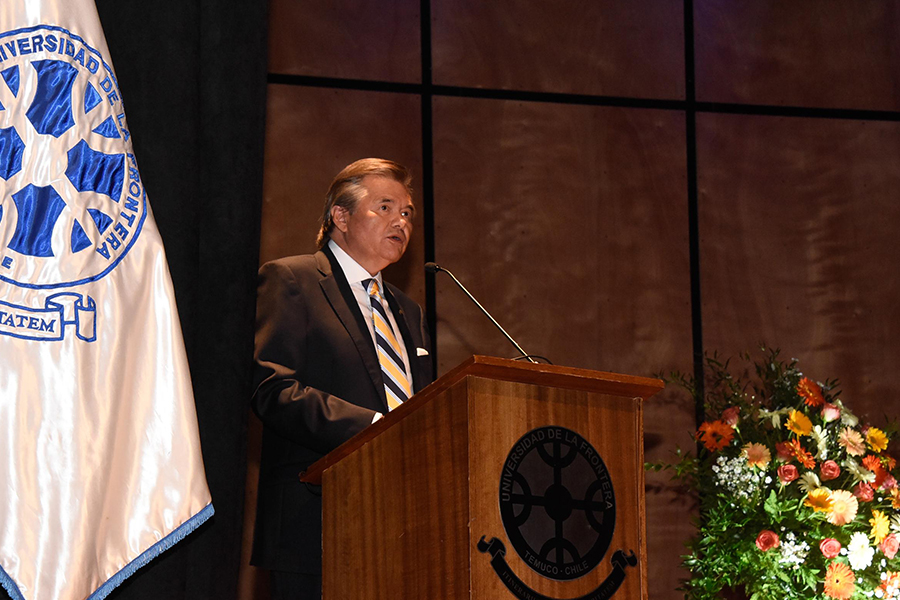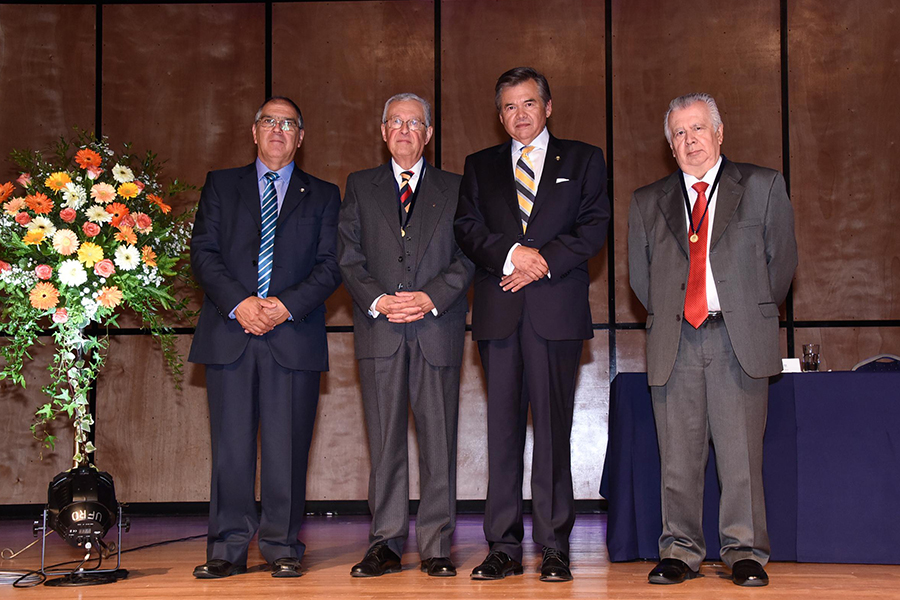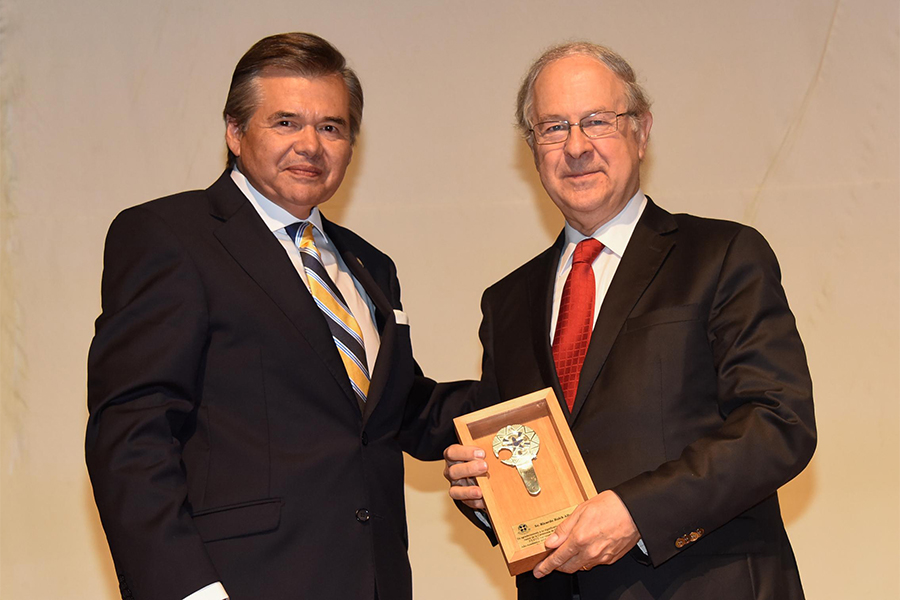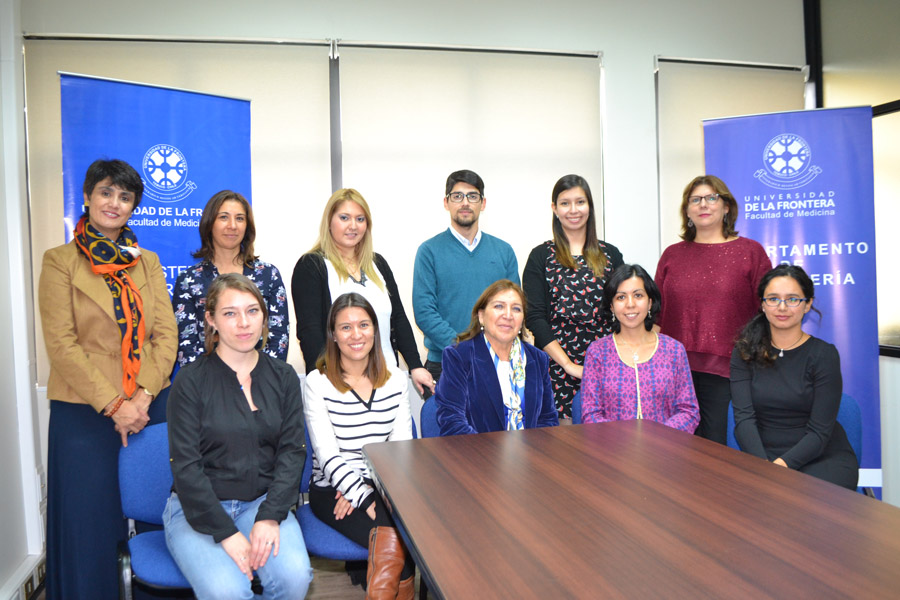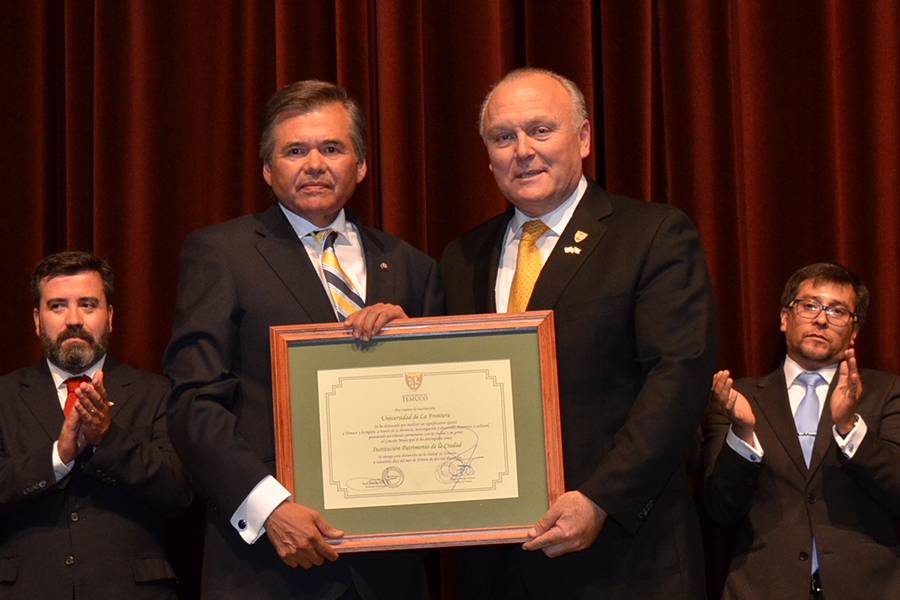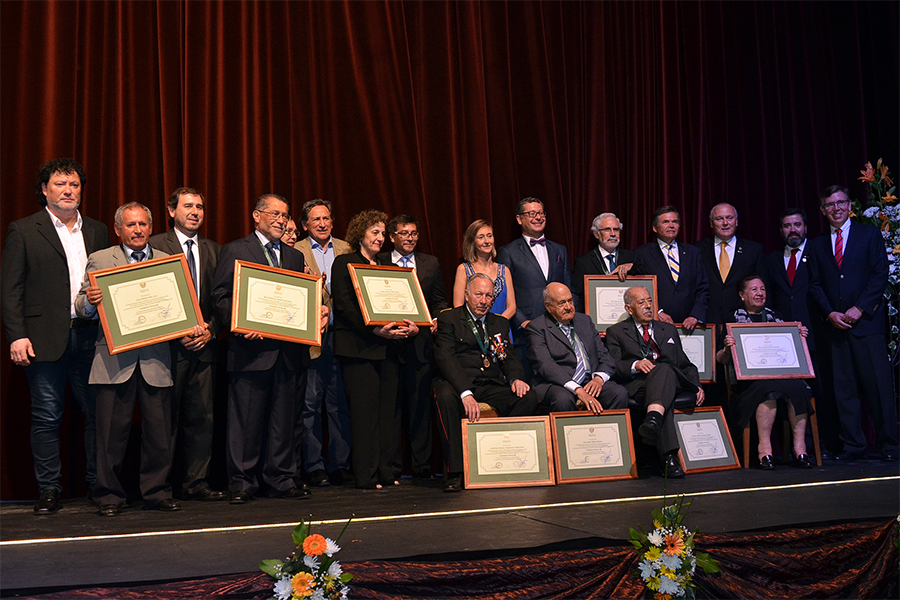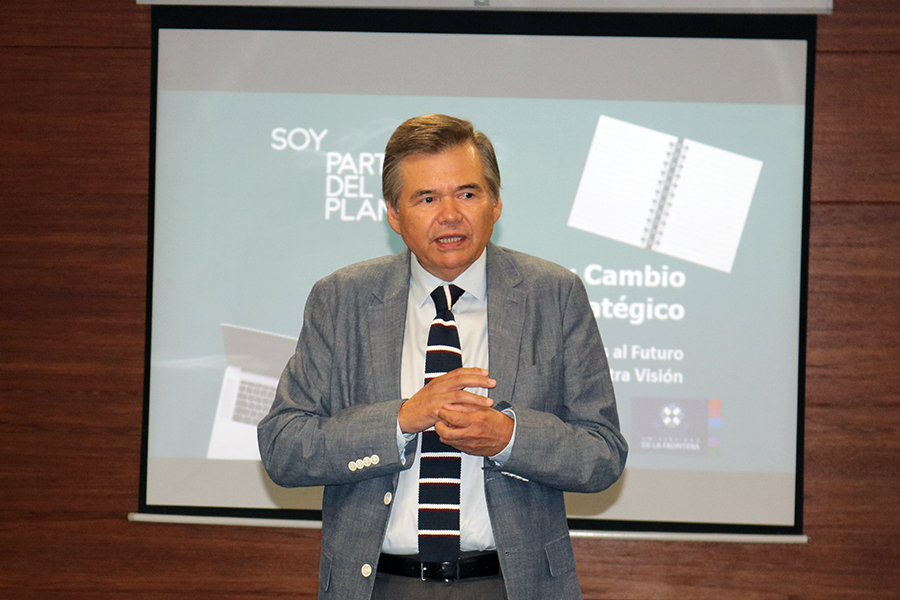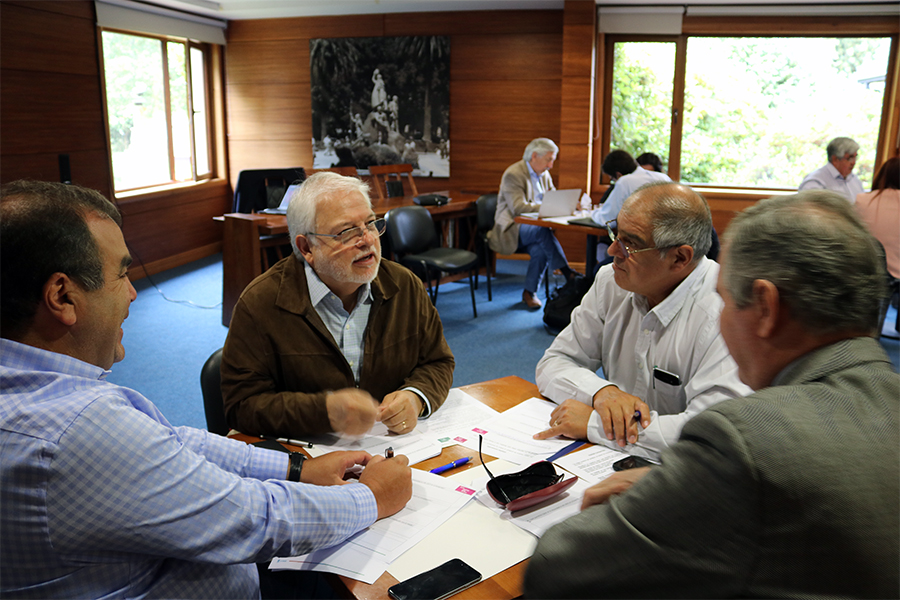|
The Ceremony of the XXXVII. Anniversary of the Universidad de La Frontera and the Opening of the Academic Year 2018 took place at the Aula Magna. |
“Because of the intentions and ambitions, the Universidad de La Frontera is not only the result of the work of the cloister. It has been knitted by thousands of wishes, enriched by hundreds of dreams and driven by the energy of hundreds of men and women who live and work in and outside of this region.” With these words, the Rector, Sergio Bravo, gave a tone of acknowledgement and gratitude to the ceremony in which the 37th Institutional Anniversary has been celebrated. Members of the University Community, authorities and representatives of civil and military organizations came together at the Aula Magna to review the institutional history and the promising present and to acknowledge that the accomplishments reached during these 37 years have been possible thanks to the spirit and the determination in the first years and the capacities and talents of who, then and today, are part of the University. “Tradition and change is the direction we are heading for. If the retrospective view permits us to contemplate with astonishment what we have built, the view of the present confirms that our energy and perseverance is still intact. To this enduring link to the past, we have to sum the acknowledgement and estimation of the present personified by the ones who give life to the institution and make it progress, despite the uncertainty”, the Rector emphasized. MEDAL FOR ACADEMIC TRAJECTORY At the ceremony of the 37th UFRO Anniversary and the opening of the academic year 2018, the Medals for Academic Trajectory at the Universidad de La Frontera have been awarded, an important acknowledgement that is given to those who stand out for their work and contribution to the institutional development. This year, Guillermo Soza Contreras and René Cifuentes Bobadilla have been awarded. Guillermo Soza Contreras is a physician (University of Chile), specialist in pediatrics and infectious diseases. He has been working as a teacher at the Health Department (University of Chile, office in Temuco), as an associate professor at the Pediatrics and Pediatric Surgery Department of the Faculty of Medicine at the UFRO and as the director of the Department just mentioned between 1981 and 1994. Between 1981-1994 and 2010-2016, he has been working as the director of the Program of Specialization in Pediatrics. René Cifuentes Bobadilla is an executing mechanical engineer at the State Technical University and a mechanical engineer at the Universidad Austral of Chile. He has a Master´s Degree in Engineering of the Technical University Federico Santa María. His specialties are hydroelectric power plants and clean energies and he has done several postgraduate courses at Universities in Mexico and Switzerland. He was the director of the Department of Mechanical Engineering and a member of the Governing Board of the UFRO. MASTER CLASS: EVALUATE TO IMPROVE The traditional Master Class of the opening of the Academic Year at the UFRO 2018, was held by Dr. Ricardo Reich Albertz, assessor for Higher Education of the Ministry of Education. His topic was the central evaluation as an instrument for permanent improvement. During his exposition, Reich emphasized the enormous advance the University has obtained during the last years, in the national and international context, delivering background and benchmarking information that permitted the assistants to calibrate the global results of particular efforts by knowing the way in which scientific productivity, the quality of the cloister, the students´ profile or the university outreach are entwined and form a University of Worldwide Prestige. Written by: Dirección de Comunicaciones
|
|
Academic staff and students who entered the Master´s Program in April 2017. The big news confirms the methodical and dedicated work of the group of professionals who are part of the academic body of this postgraduate program. The Master in Nursing with specialization in Care Management is directed by Dr. Edith Rivas who said that “the main goal we reached is that we contributed to the training of academic teams at different Universities in the country.” |
On Thursday, January 25 of 2018, the Accreditation Council in the Health area decided unanimously to accredit the Master´s Program in Nursing with specialization in Care Management of the Universidad de La Frontera for seven years, from January 25th of 2018 to January 25th of 2025. “It is a tremendous satisfaction to have reached this achievement after hard work with a dedicated team and an academic body of high-quality and productivity. These are the fundamental elements that permit us to position ourselves in our country with this accreditation. It is important to emphasize that this Master´s Program made the transition from professional to academic, and the second thing is the accreditation for seven years. I want to thank the whole academic and administrative team and the students for their commitment, since this accreditation demonstrates their quality”, assured Edith Rivas. For the Dean of the Faculty of Medicine, Dr. Patricio Valdés, “with this accreditation, we can develop and project the discipline of Nursing over the years, and why not think about a future doctoral program. The work of the academic body of the Master´s Program and the Nursing Department has solidly grown and we are proud of that.” HISTORY The Master´s Program started in 2008 with its first version. By now, it already has 75 graduates and the eleventh version starts in April 2018 with 12 selected academic staff members from different academic units in Chile. “The main goal reached by this Master´s Program is that it contributed to the training of academic teams at different national universities, such as U. Santo Tomás, U. de Los Lagos, U. Austral de Chile, U. Autónoma, U. Mayor and U. de La Frontera. Besides, today we also have students from the Felix Bulnes Hospital in Chillán and Executives of hospitals in Santiago de Chile. They had the possibility to choose other Master´s Programs, but they chose the UFRO. This accreditation permits to obtain more Conicyt (National Commission for Scientific and Technological Research) scholarships, which we already have accessed in previous years”, Rivas added. CHALLENGES One of the challenges that are coming up is to emphasize the research lines. “We have to diversify the work groups of other areas, such as social sciences, clinical epidemiology, public health, ethics and others. That is where we have an important demand and we have to apply for more funds. Another challenge is to strengthen our international relations – we have already been working with universities in Columbia and Spain – in order to advance towards specific accreditations between master´s programs, which often is difficult because of the lack of funds, since we are fully self-supported”, Rivas specified. THESIS Another milestone of the Master´s Program is the outstanding work in the different theses and the direction the students have taken in their research projects. “There has been an improvement in the theses contents. In previous years, the theses included a systematic revision with a meta-analysis, which is a more complicated and new design for nurses, with important results that might have impact on public policies. The research which is more common is the experimental and the clinical trial one, but systematic revisions do have more effective results. We can see advances in the publications and we have incipient lines and, since 2018, each student, before taking the final exam, has to present a SciELO, ISI or Scopus publication”, Rivas added. During the years of work, the Master´s Program created possibilities of extending their skills in the framework of Care Management Workshops and Colloquiums in Research in Nursing. Through these opportunities, the students get access to classes with teachers with an outstanding curriculum in Chile and internationally, and to online conferences thanks to the inversion that has been made in the academic spaces of the Nursing Department. “We are contributing to the solution of problems based on public policies with theses about gender problematics, intercultural topics, or historical socio anthropological development, but with view on Health Care and that has been a great credit. All of our thesis guiding teachers are part of the cloister, in other words, they are from the highest hierarchy, with Doctor´s Degrees and a productivity within the standards of the National Accreditation Commission (CNA) and Conicyt”, Edith Rivas concluded. Written by: Fabián Aguirre
Faculty of Medicine |
|
The Municipal Council of Temuco gave this important acknowledgement to the Universidad de La Frontera and seven “Outstanding Citizens”, among them Raúl Sánchez and Raúl Caamaño, who both are teachers at the UFRO. |
An acknowledgement for a significant contribution to Temuco and the Region, through teaching, research and sportive and cultural development was given to the Universidad de La Frontera by the Municipal Council, distinguishing it as a “Heritage Institution of the City”. This symbolic acknowledgement was given to the UFRO within the celebration of the 137th anniversary of Temuco on February 23rd at the Municipal Theater, received by the Rector, Sergio Bravo Escobar. In the interview with the Chilean newspaper El Austral, the rector expressed his gratitude about this acknowledgement and emphasized that it is the series of management actions, achievements and excellence that have led and help the UFRO to maintain a solid and leading offer in the Araucania Region, besides of turning into a leader in research and teaching. “We earned this affection over time. While the University has been growing academically, it has earned the respect of the citizens of the Araucania Region and, especially, the city of Temuco. It has been a long way.” OUTSTANDING CITIZENS In this anniversary of Temuco, the Municipal Council chose seven people as “Outstanding Citizens”, who significantly contributed to the development of the capital of the Chilean Region La Araucanía. One of them is Dr. Raúl Sánchez, an academic staff member of the Universidad de La Frontera, because of his experience and contribution in the area of gynecology and andrology, as a specialist in infertility and science, and whose research has been widely acknowledged in Chile and internationally. He explained in the regional media that he sees this acknowledgement as an award for a whole team of scientists under the wing of the Universidad de La Frontera. “As they say, “nobody is a prophet in his own land” and, in general, the scientists are recognized abroad, but I think what transcended is that we developed a method to preserve men´s fertility here in Temuco.” With a more than 47 years long teaching career, the Spanish teacher Raúl Caamaño has also been acknowledged this year. He has been teaching for 25 years at the UFRO and contributed to the training of more than 10 thousand professionals at the Universities Universidad Católica of Temuco and the Universidad de La Frontera. In the interview with the El Austral newspaper, he said that this “is an acknowledgement you do not pursue. And the fact, that something of my professional work stands out and is honored makes me proud, flatters me and commits me. I am someone who is thankful for life.”
|
|
Relevance, comprehensive professional training, internationalization, quality and outreach and community engagement – these are the pillars that will support the work of the Universidad de La Frontera over the next five years. |
In the sceneries country, contingents and the approbation in the parliament of the Reform Law of Higher Education and the Law of Public Universities, make it necessary to reflect on the road behind and in front of us, as a University, with view on the next five years. In this context, the Executive Committee and the Deans of the University got together in order to adjust and define the actual vision of the UFRO and, this way, formulate the institution´s goals. According to the rector, Sergio Bravo, this is the right time to do that, since we are at a defining moment. “We cannot rest on this status quo. I want to clarify that this is not a change of vision. The essence of the University remains. This is just a readjustment of what we declared as an institution in order to broaden the possibilities of action, putting an emphasis on what we want to do and where we want to go, with a strategic view.” He added that, with the future implementation of these laws, the State will force the public universities to work with it. “Large part of the resources we are going to receive will have a specific focus, thinking about how the University is linked to its environment. And this is why we have to take a look at our University and define where we want to be in the next five years.” FOCUS The focus will be put on the fact that the institution cannot lose sight of the tendencies, the scenario of competencies, the collaboration and the necessity of building more and better networks in order to position itself in different levels and to meet the social demands of the environment. The just mentioned has to be accompanied by the quality and excellence which distinguishes the University, but also has to progress and improve in order to keep with the new times. “This definitely is an anticipated task that wants to anticipate the challenges that are still coming. When we do this work, we are giving a strong signal, because it shows that we are a university with the capability of self-regulation and that shows quality,” the director of Institutional Analysis, Dr. Ricardo Herrera, added. WORLD-CLASS UNIVERSITY The seal that has been created by the Ministry of Education includes having world-class universities, because Chile wants and has to enter this scenario. And as a regional university, it is necessary to keep up with the changes. “Internationalization and quality are two topics we cannot ignore. We have to keep working in this field, with a strategic point of view that assures that our national and international links are strong; that our excellence is on a high level because of the quality of the processes we carry out. We have to keep being good in who we are and persist in that. It is the only way for being able to stay competitive and attractive,” the rector pointed out.
|
|
Once again, the UFRO shows that it is one of the most prestigious universities in Chile, by obtaining 31 scholarships for doctoral studies by CONICYT (Chilean National Commission for Scientific and Technological Research) in 2018. |
This is a new achievement in the management of postgraduate affairs for the Universidad de La Frontera. The recent approval of scholarships by CONICYT shows the quality and excellence of the programs offered and their students. Compared to last year, in which nineteen projects have been accepted, the number in 2018 is a very important indicator for the University. “This is an extraordinary result that underlines the training of advanced human capital and also shows professionals who aspire to do high-level postgraduate studies which programs have the biggest impact at the national and regional level”, the Vice-rector of Research and Postgraduate Affairs, Dr. Eduardo Hebel, commented. He pointed out that this is an advance within a working line incentivized by the Vice-rectory together with the programs that has to do with four fundamental pillars: firstly, diligent work in regard to accreditations, since five of the 10 doctoral programs of the UFRO are accredited and the other five are in the process of accreditation. Secondly, the strengthening of the programs´ research lines by including postdoctoral students who increased the critical mass and the research indicators. Another important factor is the internationalization management, which significantly contributed to the international accreditation of the Doctorate in Natural Resource Sciences and the Doctorate in Sciences with specialization in Applied Cellular and Molecular Biology, both recognized by the European agency AQAS. “I also want to highlight the communicational effort the Vice-rectorate and the University put into the dissemination of the work of the programs, what makes it possible to be recognized at the national and international level.” THE BEST The Academic Director of Postgraduate Affairs, Juan Carlos Parra, said that these 31 scholarships emphasize not only the quality of the programs, but also the academic excellence of the students. “Here, we are working with rigor. The ones who want to do their postgraduate studies at our university clearly have a high level and that is something that makes us proud, because an important number of professionals is interested in our programs.” BENEFITED PROGRAMS Doctorate in Sciences with specialization in Applied Cellular and Molecular Biology: 7
Written by: Lorena Espinoza
Vice-rectorate of Research and Postgraduate Affairs |





